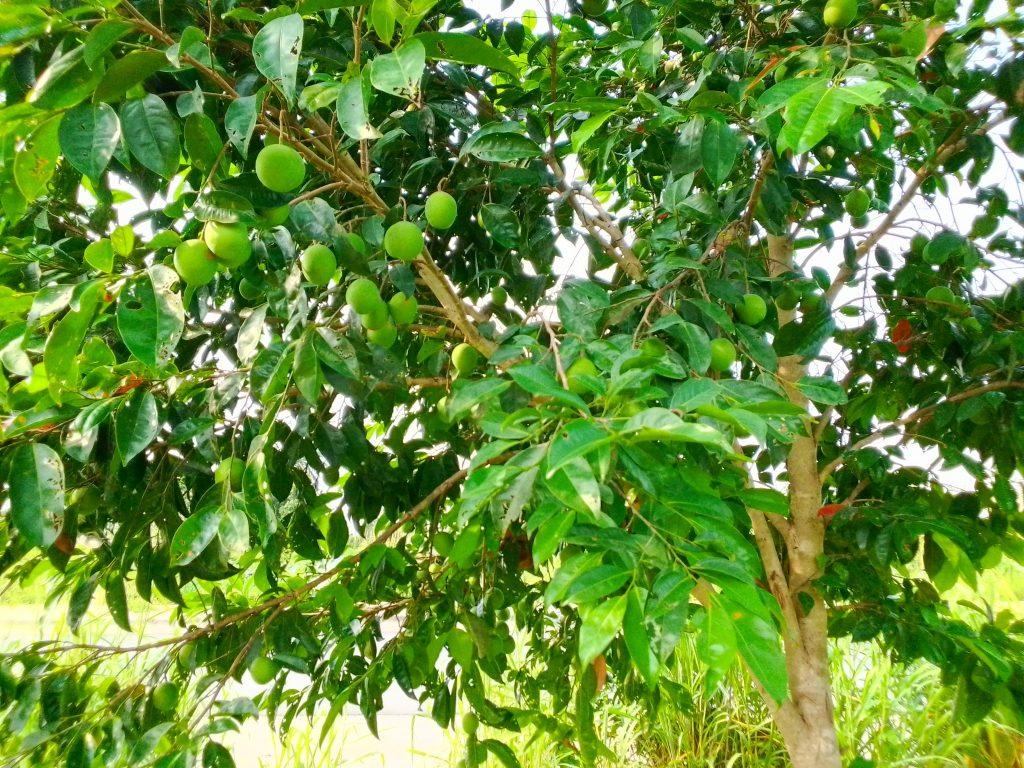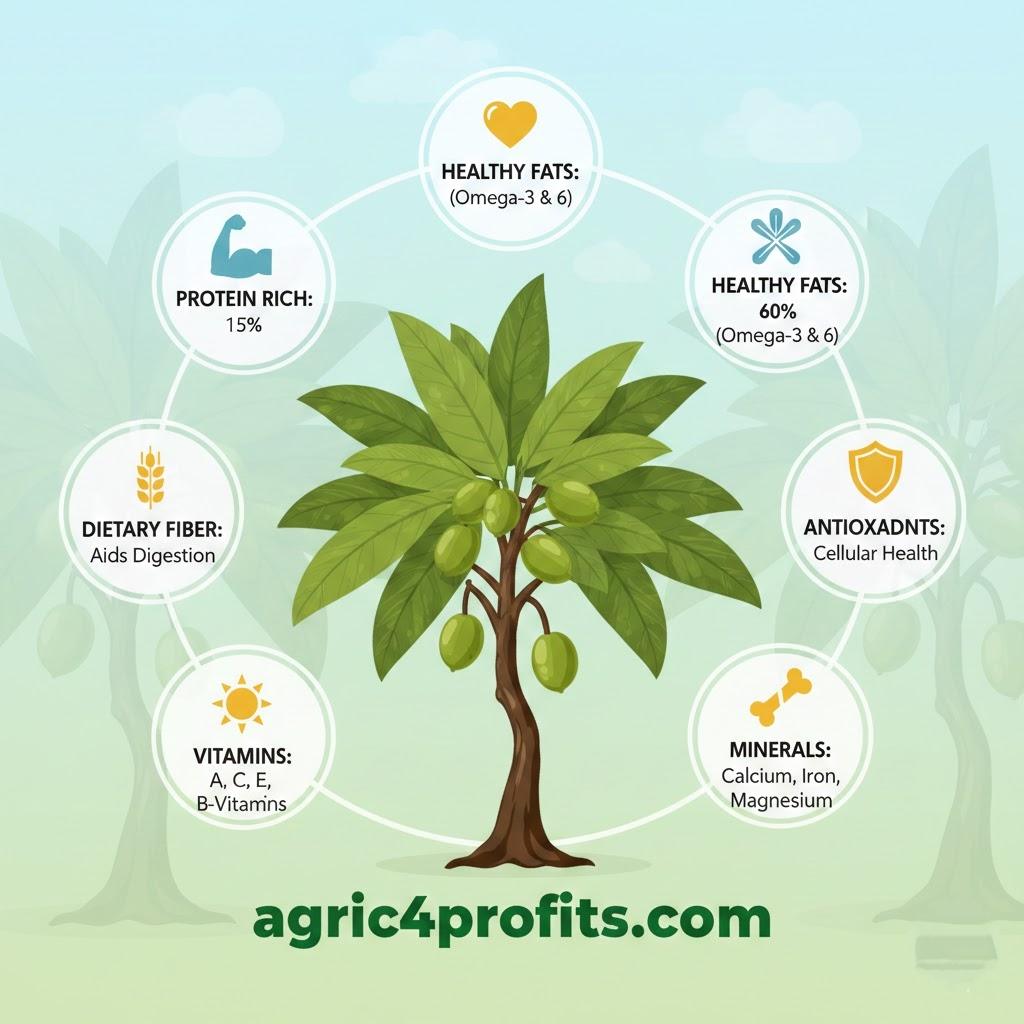The Ogbono plant, scientifically known as Irvingia gabonensis, is native to West and Central Africa and is prized for its edible seeds. These seeds, often ground into powder, serve as a staple in traditional soups and stews, delivering exceptional flavor, texture, and a rich array of essential nutrients.
Ogbono seeds stand out for their high dietary fiber content, including both soluble and insoluble types. This fiber supports digestive health by promoting regular bowel movements, preventing constipation, lowering cholesterol levels, improving blood sugar control (beneficial for diabetes management), and enhancing satiety for weight management.
The seeds are also rich in healthy fats, mainly monounsaturated and polyunsaturated fatty acids. These fats promote heart health by reducing bad cholesterol (LDL) while increasing good cholesterol (HDL), and they contribute anti-inflammatory effects that may lower the risk of chronic diseases.
Ogbono provides a solid source of plant-based protein, ideal for vegetarians and vegans. The protein supports tissue repair, immune function, hormone production, and muscle health, with an amino acid profile that bolsters overall bodily functions.
Additionally, Ogbono contains key vitamins and minerals. Vitamins include vitamin A (for vision and immunity) and various B vitamins (for energy metabolism). Minerals such as potassium, magnesium, and zinc aid nerve function, muscle contraction, and immune response.
Ogbono seeds also offer antioxidant compounds that combat oxidative stress, potentially reducing risks of heart disease, cancer, and diabetes. Overall, Ogbono enhances dietary quality, supports preventive health, and adds versatility to modern and traditional diets.
Read Also: 13 Medicinal Health Benefits of Evening-Primroses (Oenothera)
Historical Significance of Ogbono

Ogbono, from the seeds of the Irvingia gabonensis tree (also called wild mango or African mango), holds deep cultural and culinary importance in West and Central Africa. Indigenous communities, including the Yoruba, Efik, and Ibibio, have used it for centuries as both food and medicine.
Traditionally, ground Ogbono seeds create the signature thick texture in soups like Ogbono soup, served at gatherings, ceremonies, and special occasions, reflecting its role in social and food security practices.
Cultivation has evolved from wild harvesting to sustainable farming and agroforestry, preserving biodiversity while meeting demand.
In traditional medicine, Ogbono addresses obesity, diabetes, and gastrointestinal issues, highlighting the link between food and health in African cultures.
Global interest has grown, with research exploring its benefits for weight management and health, while trade supports local economies through sustainable value chains.
Nutritional Composition of Ogbono Seeds
1. Macronutrients: Ogbono seeds are rich in carbohydrates, healthy fats, and dietary fiber, providing energy, digestive support, gut health, and satiety for weight management.
2. Caloric Value: They offer concentrated energy, suiting high-energy needs in active lifestyles or demanding environments.
Vitamins Present in Ogbono
1. Vitamin A: Supports vision, skin health, and immune function by maintaining retinal and mucosal barriers.
2. Vitamin B Complex: Includes B1, B2, B3, B5, B6, and B9, aiding energy metabolism, brain function, red blood cell production, and fetal development.
3. Vitamin E: Acts as an antioxidant to protect cells, support skin healing, boost immunity, and reduce inflammation.
Minerals Found in Ogbono
1. Calcium: Essential for strong bones/teeth, muscle function, nerve signaling, and blood clotting; helps prevent osteoporosis.
2. Magnesium: Involved in energy production, protein synthesis, muscle contraction, blood pressure regulation, and reducing chronic disease risk.
3. Potassium: Regulates fluid balance, muscle/nerve function, and blood pressure; supports heart health and lowers stroke risk.
4. Iron: Key for hemoglobin formation and oxygen transport; prevents anemia, especially in plant-based diets.
5. Zinc: Boosts immune function, wound healing, protein synthesis, and sensory functions; reduces infection susceptibility.
Health Benefits of Ogbono

1. Nutrient-Dense Superfood: Packed with vitamins, minerals, healthy fats, and fiber for overall well-being.
2. Anti-Inflammatory Properties: Healthy fats and antioxidants help reduce chronic inflammation linked to heart disease, diabetes, and cancer.
3. Support for Heart Health: Promotes healthy cholesterol levels, lowers blood pressure, and reduces cardiovascular risks.
4. Boosting Immune Function: Vitamin A, zinc, and other nutrients strengthen defenses against infections.
Additional benefits include blood sugar regulation from fiber, weight management support, and antioxidant protection against oxidative stress.
Read Also: Bird of Paradise Flower (Strelitzia reginae): All You Need To Know About
Scientific Evidence and Case Studies on Ogbono Plant Nutritional Value

1. High fiber and healthy fats: Ogbono seeds provide substantial dietary fiber and unsaturated fats that support digestive health and cardiovascular benefits.
2. Weight management support: Compounds in the seeds contribute to satiety and potential fat reduction effects.
3. Blood sugar control: Fiber slows sugar absorption, aiding stable glucose levels.
4. Antioxidant activity: Seeds contain compounds that combat oxidative stress and inflammation.
5. Nutrient richness: Rich in protein, vitamins (A, B-complex, E), and minerals (calcium, magnesium, potassium, iron, zinc) for overall nutritional enhancement.
Summary of Ogbono Plant Nutritional Value
| Section | Key Points |
|---|---|
| Introduction | Irvingia gabonensis seeds are nutrient-rich, used in African soups for flavor, texture, and health benefits including fiber, healthy fats, protein, vitamins, and minerals. |
| Historical Significance | Deeply rooted in West/Central African cultures for food (e.g., Ogbono soup), medicine, and economy; evolving to sustainable cultivation and global recognition. |
| Nutritional Composition | High in macronutrients (fats, fiber, protein), calories, vitamins (A, B-complex, E), and minerals (calcium, magnesium, potassium, iron, zinc). |
| Health Benefits | Supports digestion, heart health, immunity, anti-inflammation, blood sugar control, weight management, and antioxidant protection. |
| Culinary Uses | Acts as thickener, nutritional booster, flavor enhancer in soups/stews; also used traditionally in medicine. |
Frequently Asked Questions
1. What is Ogbono?
Ogbono refers to the seeds of the Irvingia gabonensis tree, commonly known as wild mango or African mango, widely used in West African cuisine.
2. What are the main nutrients in Ogbono seeds?
Ogbono seeds are rich in dietary fiber, healthy unsaturated fats, plant-based protein, vitamins (A, B-complex, E), and minerals (calcium, magnesium, potassium, iron, zinc).
3. How does Ogbono help with digestion?
Its high soluble and insoluble fiber content promotes regular bowel movements, prevents constipation, and supports a healthy gut microbiome.
4. Can Ogbono seeds aid in weight management?
Yes, the fiber and healthy fats increase satiety, helping individuals feel fuller longer and potentially supporting calorie control.
5. Is Ogbono good for heart health?
Yes, its monounsaturated and polyunsaturated fats help lower bad cholesterol, raise good cholesterol, and reduce cardiovascular risks.
6. Does Ogbono support blood sugar control?
The dietary fiber slows sugar absorption, contributing to more stable blood glucose levels, which benefits diabetes management.
7. What are the traditional uses of Ogbono?
Traditionally used as a soup thickener in dishes like Ogbono soup and in herbal remedies for ailments such as obesity, diabetes, and digestive issues.
8. Are Ogbono seeds a good protein source for vegetarians?
Yes, they provide high-quality plant-based protein with essential amino acids, making them valuable for vegetarian and vegan diets.
9. What vitamins and minerals are prominent in Ogbono?
Key ones include vitamin A for vision/immunity, B vitamins for energy metabolism, vitamin E as an antioxidant, plus calcium, magnesium, potassium, iron, and zinc.
10. How is Ogbono typically consumed?
Ground into powder and used as a thickening agent in soups, stews, sauces, or added to recipes for nutritional and flavor enhancement.
Do you have any questions, suggestions, or contributions? If so, please feel free to use the comment box below to share your thoughts. We also encourage you to kindly share this information with others who might benefit from it. Since we can’t reach everyone at once, we truly appreciate your help in spreading the word. Thank you very much for your support and for sharing!
Disclaimer: This article is for educational and informational purposes only. The health benefits described are based on scientific research and traditional knowledge. They ayre not a substitute for professional medical advice, diagnosis, or treatment. Always consult a healthcare professional before using any herb or natural remedy for medical purposes.
Read Also: A Comprehensive Guide To Circular Economy Consulting

